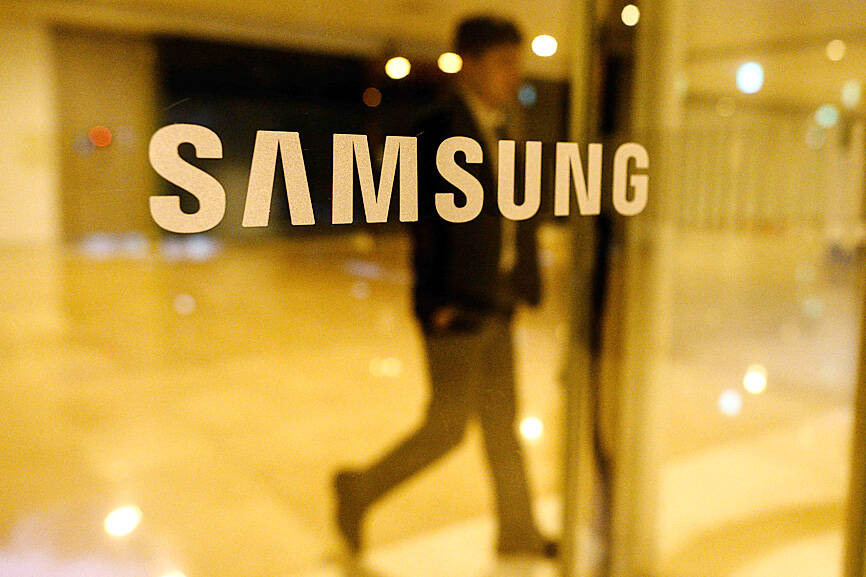Samsung Electronics Co yesterday announced a record first quarter sales forecast and said it saw a better-than-expected performance for profits, even as analysts warned US tariffs could soon impact the South Korean tech giant.
In a regulatory filing, Samsung predicted its January to last month operating profits to rise to 6.6 trillion won (US$4.46 billion), down 0.15 percent from a year earlier but up about two percent on the previous quarter.
This was almost 34 percent higher than the average estimate, said South Korea’s Yonhap news agency, which cited its own financial data firm.

Photo: AFP
Samsung is a chip powerhouse, and one of the world’s largest makers of mobile phones.
The company said sales were also seen increasing to 79 trillion won, a near 10 percent jump from a year earlier, marking the highest first-quarter figure on record and the second-highest quarterly revenue ever.
The company did not disclose its net income or the detailed earnings of its business divisions.
However, experts say US President Donald Trump’s reciprocal tariffs could heavily impact Samsung as more than half of its smartphones are made in Vietnam, which now faces a 46 percent US duty.
“Samsung’s consensus-beating first-quarter operating profit implies its popular product offerings, such as Galaxy smartphones, could weather a tough business environment, when combined with strong cost control capabilities,” Bloomberg Intelligence analysts said. “Yet the pace of profit growth might slow in the second quarter given most of its smartphones are made in Vietnam, which subjects them to US import tariffs.”
The high figures forecast were partly down to record sales of the new Galaxy S25 series phone, which was released in February, experts said.
Samsung also benefited from strong demand for server DRAM — mostly used in data centers — which offset slowing prices for more conventional high-end chips, TrendForce Corp (集邦科技) analyst Tom Hsu (許家源) said.
There was “strong purchase momentum” from some US and Chinese cloud service providers, who were investing in their data centers, he said.
However, “with the US government imposing substantial tariffs, leading to a potential for economic uncertainties,” demand is likely to fall, which could hit prices, he added.
Because of US rules limiting the export of artificial intelligence chips to China, and Beijing’s push to use more local suppliers, fewer orders are going to companies such as Samsung, TrendForce analyst Joanne Chiao (喬安) said.
“Because of this, Samsung Foundry’s sales are expected to go down in the first quarter of 2025 compared to the previous quarter,” Chiao said.
Looking ahead, “geopolitical factors” are making it harder for some of Samsung’s Chinese customers to use advanced technology.
“This is dampening overall demand momentum,” and as a result, slowing Samsung’s total sales growth this year, she said.

BYPASSING CHINA TARIFFS: In the first five months of this year, Foxconn sent US$4.4bn of iPhones to the US from India, compared with US$3.7bn in the whole of last year Nearly all the iPhones exported by Foxconn Technology Group (富士康科技集團) from India went to the US between March and last month, customs data showed, far above last year’s average of 50 percent and a clear sign of Apple Inc’s efforts to bypass high US tariffs imposed on China. The numbers, being reported by Reuters for the first time, show that Apple has realigned its India exports to almost exclusively serve the US market, when previously the devices were more widely distributed to nations including the Netherlands and the Czech Republic. During March to last month, Foxconn, known as Hon Hai Precision Industry

Taiwan Semiconductor Manufacturing Co (TSMC, 台積電) and the University of Tokyo (UTokyo) yesterday announced the launch of the TSMC-UTokyo Lab to promote advanced semiconductor research, education and talent development. The lab is TSMC’s first laboratory collaboration with a university outside Taiwan, the company said in a statement. The lab would leverage “the extensive knowledge, experience, and creativity” of both institutions, the company said. It is located in the Asano Section of UTokyo’s Hongo, Tokyo, campus and would be managed by UTokyo faculty, guided by directors from UTokyo and TSMC, the company said. TSMC began working with UTokyo in 2019, resulting in 21 research projects,

Ashton Hall’s morning routine involves dunking his head in iced Saratoga Spring Water. For the company that sells the bottled water — Hall’s brand of choice for drinking, brushing his teeth and submerging himself — that is fantastic news. “We’re so thankful to this incredible fitness influencer called Ashton Hall,” Saratoga owner Primo Brands Corp’s CEO Robbert Rietbroek said on an earnings call after Hall’s morning routine video went viral. “He really helped put our brand on the map.” Primo Brands, which was not affiliated with Hall when he made his video, is among the increasing number of companies benefiting from influencer

Quanta Computer Inc (廣達) chairman Barry Lam (林百里) yesterday expressed a downbeat view about the prospects of humanoid robots, given high manufacturing costs and a lack of target customers. Despite rising demand and high expectations for humanoid robots, high research-and-development costs and uncertain profitability remain major concerns, Lam told reporters following the company’s annual shareholders’ meeting in Taoyuan. “Since it seems a bit unworthy to use such high-cost robots to do household chores, I believe robots designed for specific purposes would be more valuable and present a better business opportunity,” Lam said Instead of investing in humanoid robots, Quanta has opted to invest